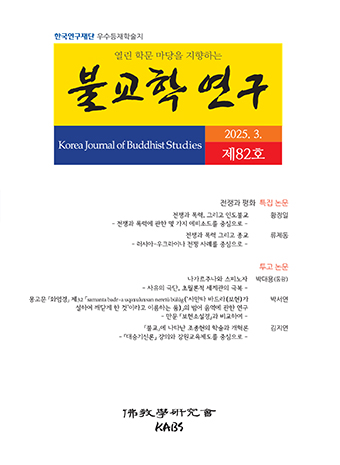Abstract
References
Sorry, not available.
Click the PDF button.
Information
The present paper examines the Theravāda Buddhist attitude towards prostitution and explores its solutions. Prostitution, often known as the world’s oldest profession, existed in India prior to the Buddha’s time. Like polygamy, prostitution was never expressly condemned by the Buddha. Prostitutes, called vesiyā, gaṇikā, nagara-sobhinī at different times in Pāli texts, are not bound by marital relations; therefore, having sexual intercourse with them is not in violation of the prohibition against debauchery. However, in the Vinaya-piṭaka, a prostitute is identified as a temporary wife (muhuttikā), which falls under the ten types of wives (dasa-bhariyāyo) and twenty types of women to whom the observance of this precept applies. This suggests that if someone else were to approach a prostitute while she is already under contract with a man, both the man outside of contract and the prostitute would violate the precept. From the Theravādin perspective, prostitution itself is neither wholesome (kusala) nor unwholesome (akusala), but is indeterminate (avyākata). In order to understand why this is so, one should recognize the fact that being a prostitute is a condition to which a person is reborn as a consequence of some unwholesome karma (akusala-kamma) accrued in a previous existence. This suggests that a prostitute is not an immoral criminal but a type of existence characterized by suffering (dukkha). We can never root out prostitution simply because the majority of people are governed by sexual desire (kāmā-rāga) in the sensual sphere (kāma-loka). Removing prostitution from society therefore would unleash uncontrollable lust and promote degeneracy. It is for this reason that prostitution is not defined as wrong livelihood (micchājīva) in the Pāli canon. The Theravāda buddhist way of dealing with the problem is not legalistic, but therapeutic. Sexual desire, like any other craving, is to be eradicated not by legal prohibition or suppression but by gradual removing its fundamental causes through mental development (bhāvanā) such as meditation on the foulness of the body (asubha-bhāvanā).
본 논문의 목적은 테라와다 불교의 관점에서 매춘을 고찰하고 그 해법을 모색하는 것이다. 세계에서 가장 오래된 직업으로 알려진 매춘은 불교가 흥기하기 전 고대 인도에도 존재했다. 붓다는 일부다처제(一夫多妻制)와 마찬가지로, 매춘을 명시적으로 비난하지 않았다. 빨리 텍스트들에서 웨시야(vesiyā), 가니까(gaṇikā), 나가라소비니(nagara-sobhinī)라 불리는 매춘부는 결혼 관계에 얽매이지 않은 신분이기 때문에 매춘부와 성관계를 가지는 것은 불사음계를 어기는 것이 아니다. 하지만 『위나야 삐따까(Vinaya-piṭaka)』에 따르면, 매춘부는 불사음계의 준수가 적용되는 10가지 아내와 20가지 여성들에 나타나는 임시 아내(muhuttikā)이다. 이는 매춘부가 다른 남자와 이미 계약되어 있다면, 그녀에게 다가가는 남자와 매춘부 양자는 모두 불사음계를 어기는 것임을 뜻한다. 테라와다 불교의 관점에서 매춘 자체는 선(善, kusala)도 불선(不善, akusala)도 아닌 무기(無記, avyākata)일 따름이다. 왜 그런지를 이해하려면, 우리는 매춘부가 자신이 전생에 지은 불선업(不善業, akusala-kamma)의 결과(vipāka)를 받기 위해 그러한 존재로 다시 태어났을 뿐이라는 사실을 인정해야만 한다. 이는 매춘부가 부도덕한 범죄자가 아니라 괴로움(苦, dukkha)이 특징인 존재임을 암시한다. 욕계(欲界, kāma-loka)에서 절대 다수의 사람들은 감각적 욕망(kāmā-rāga)의 지배를 받는다는 단순한 이유 때문에 매춘을 근절할 수 없다. 사회에서 매춘을 없애버리면 통제할 수 없는 성욕이 분출되고 성도착이나 도덕의 퇴보를 조장하게 될 것이다. 빨리 성전에서 매춘이 그릇된 생계(邪命, micchājīva)로 규정되지 않고 있는 이유도 여기에 있을 것이다. 테라와다 불교가 문제를 다루는 방식은 법제도를 통해서가 아닌 치유적인 방법을 통해서이다. 다시 말하면, 성욕은 다른 욕망들과 마찬가지로 제도적 금지나 억압에 의해서가 아니라 부정 명상(asubha-bhāvanā)과 같은 명상을 통해 그 뿌리를 서서히 제거해야만 한다.
Click the PDF button.
- Publisher :Korean Association of Buddhist Studies
- Publisher(Ko) :불교학연구회
- Journal Title :Korean Journal of Buddhist Studies
- Journal Title(Ko) :불교학연구
- Volume : 42
- Pages :113 ~ 140


 Korean Journal of Buddhist Studies
Korean Journal of Buddhist Studies






